Part 2 The fightback begins - Part
3 Return of the Mac - Results and table
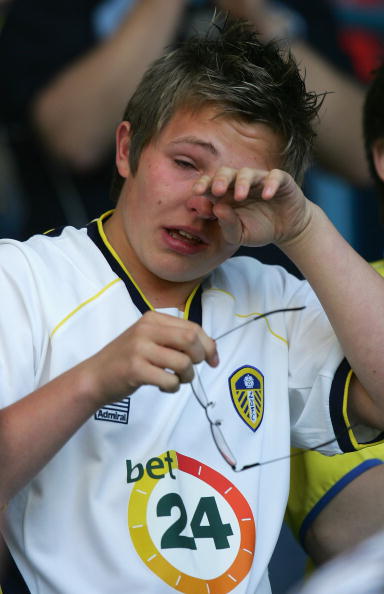
Administration and aftermath - The
Chronology
On 8 May 2001, Leeds United were in Valencia's Mestalla Stadium tilting
at a place in the Champions' League final. Six years later the club was
relegated to the third tier of English football for the first time and
pitched into the maelstrom of financial administration; it was an astonishing
fall from grace.
At the end of a disastrous 2006/07
season, failure to beat Ipswich Town at Elland Road on 28
April had all but confirmed relegation. United had a game still
to play, but the vast inferiority of their goal difference made
the task of overtaking Hull City, even if they could eradicate
the three-point gap, a remote mathematical possibility.
With the club's financial position brittle to say the least,
United chairman Ken Bates saw his opportunity and the club opened
feverish discussions with the accountants, KPMG. By 4 May Leeds
United had been placed in administration and the business and
assets sold to Leeds United Football Club Limited, a new company
set up by Bates and his fellow directors.
The move smacked of opportunist manipulation, with the resultant 10-point
penalty an irrelevance that served merely to formally confirm the inevitable
relegation. The numerous enemies that Bates had made over the years were
beside themselves with righteous indignation, but the man himself was
bullishly unrepentant, snapping, 'People in Leeds tell me they need a
successful club. Well they need to get off their backsides and come and
support the club. Show us your money. When we're back where we belong,
we'll remember the people who did support us and those who didn't support
us. Revenge will be a dish best eaten cold.'
At the end of March, the club's balance sheet groaned under debts
of £35m, with a cash injection of £10m required to continue trading.
This position made administration inevitable, and provided the
club with an opportunity to develop a Company Voluntary Arrangement
(CVA), a legal procedure defined under the Insolvency Act, which
enables a company to settle its debts at a discounted rate, and
requires the approval of 75% of the voting creditors. The Football
League insists on a CVA as the only acceptable means for a club
to exit administration if it wishes to retain its League membership.
With Bates confidently claiming to have 75% of votes in the bag,
it seemed that the crippling liabilities that had dogged Leeds
United for years were to be eradicated in one fell swoop. But
the club's financial affairs have rarely been straightforward
and there was a summer of intrigue to come during which a football
club nearly disintegrated.
The crisis had been brought to a head by a pre-emptive move from
Her Majesty's Revenue and Customs (HMRC).
United had been paying £200,000 a month to clear a historic tax
liability, but cashflow problems led to a failure to meet the
payments in March and April, breaching the terms of a 'time to
pay' agreement. HMRC lost patience and served a winding up petition
on April 17, meaning that if the club could not clear its £5m
debt by 27 June, it could be forced into liquidation.
This came as something of a surprise. Bates had been boasting
for some months that the club was now trading profitably and the
crippling effects of exorbitant contracts with the likes of Danny
Mills were almost at an end. To underpin their position, in the
9 months to March United had raised £7.3m from the sale of players,
including Rob Hulse, Matthew Kilgallon and Simon Walton, and received
a settlement of around £4m from Chelsea for the tapping up of
two youth players. Additionally, Astor Investment Holdings had
loaned the club £11.3m between August 2005 and October 2006 and
the Forward Sports Fund had paid £2.5m for shares in the club.
Money was evidently still pouring out of Elland Road.
back to top
On 14 May, KPMG wrote to creditors, summarising the state of
play, announcing the details of the creditors meeting planned
for 1 June and listing around 1,350 unsecured creditors totalling
£38,100,038. This was summarised as follows:
summarised as follows:
- Astor, a British Virgin Islands-registered company £12,726,687
- Shortfall to football creditors £8,089, 955
- HMRC £6,866,516
- Trade creditors £3,216,496
- Krato Trust, another offshore company, registered at a PO
box in Charlestown, Nevis in the West Indies £2,492,761
- Forward Sports Fund, the Swiss-based main shareholders of
the club £2,419,000
- Compensation fees due to ex-players £631,595
- 20 year season ticket holders £625,163
- Agents fees £407,697
- Finance leases £257,600
- Deposits £127,089
- Unsecured element of employee claims £108,966
- Memberships and subscriptions £106,378
- Pensions £24,134
The deal put forward by Bates was for a payment to non-football
creditors of 1p in the pound, meaning that HMRC would receive
just £69,000 in settlement of the £6.9m debt.
There were two major barriers to Bates' scheme: the interest
of rival bidders and the taxman's intransigence.
Intense press speculation followed about potential bidders, including:
- former Sheffield United chairman Mike McDonald
- former Hull City chairman and United director Adam Pearson
- Yorkshire-based internet tycoon Peter Wilkinson
- Las Vegas-based billionaire Dominic Marrocco
- Microsoft co-founder Paul Allen
- former West Ham chairman Terry Brown
- Leeds United Supporters Trust
- a consortium headed by Dubai-based Sheikh Samir A S Mirdad,
chairman of the Linx Group
- Duncan Revie, the son of legendary
United manager Don.
Revie's family connection appealed to the fans and made him the popular
choice. He confided in the Mail on Sunday, 'What is happening to
Leeds is a bloody disgrace. When things get this bad, I can't ignore it.
My feelings run 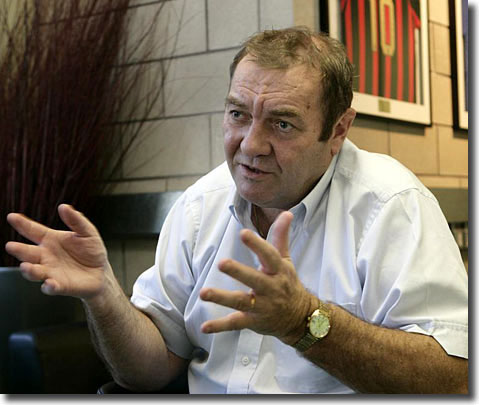 too
deep. I am interested in trying to get Leeds back where they belong, which
is in the top six of the Premiership. I've held talks with some influential
people and the feedback has been good. I will be holding more talks in
the next few weeks. The money is not a problem ... But that is not the
point. I will not make any approach until I am 100 per cent certain that
I can find the management team that will put Leeds United back on its
feet.'
too
deep. I am interested in trying to get Leeds back where they belong, which
is in the top six of the Premiership. I've held talks with some influential
people and the feedback has been good. I will be holding more talks in
the next few weeks. The money is not a problem ... But that is not the
point. I will not make any approach until I am 100 per cent certain that
I can find the management team that will put Leeds United back on its
feet.'
Revie refused to commit himself to the timescales set by KPMG
and hinted that he would bide his time. That left the most tangible
hopes resting with Simon Franks' Redbus investment vehicle and
Simon Morris.
29-year-old Morris was the major investor in the
consortium that bought United in 2004. He was a property entrepreneur
and had recently been named among the top 10 richest Britons under
30, with a fortune estimated at £69m.
It was understood that a key element of his plans involved buying back
the Elland Road stadium and developing land around it into an entertainment
complex. Morris spoke of building a 50,000-seater stadium as part of a
£400m 'world-class leisure venue'. He also claimed that he would provide
a further £25m to bring financial stability to Elland Road.
back to top
At the end of May, Harry Harris wrote: 'An attempted £1billion business
coup designed to discredit Leeds chairman Ken Bates, remove him from power
at Elland Road and buy up the stadium for redevelopment, has been uncovered
by the Daily Express. The plan, commissioned by would-be Leeds
buyer Simon Morris, entails compiling a black book on Bates and others
involved in the ownership of land adjacent to the club. Elland Road plus
two other sites would net £1bn according to a confidential memo.
'Code-named Project Peacock, the plan was drawn up last month. The intention
was to activate it as the club hit their lowest ebb - once relegated and
then wound up.
'The document outlines Project Peacock in "The Brief". It explains
that the 'target development area' consists of three sites adjacent to
one another - Elland Road (owned by Jacob Adler); a British Road Haulage
site owned by the Castle family and over which Stanley Leisure has an
option which expires on 2 July; and a council-owned plot.
'Project Peacock's objective is to acquire all three sites for development,
relocating Leeds United to a site nearby which would be supported by retail
outlets and a 50,000-seat arena.'
The other major bidder, Simon Franks, was head of the Redbus
Group, a corporate fund that specialised in turning around ailing
companies.
The Redbus approach was lower key than the Morris plan, although
Franks was ardent in his pursuit of the opportunity. Redbus claimed
to have £35m at its disposal and, after paying off creditors,
would commit the remainder to player wages and transfer fees rather
than to the buyback of the freeholds at Elland Road and the Thorp
Arch training ground.
Even with so much interest in the club, there was still a shadow
on the horizon.
HMRC had long been fiercely opposed to the requirement for football
creditors to be treated as preferential creditors, thereby reducing
the money available to normal creditors. In 2004, HMRC took 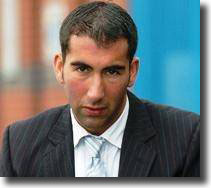 Wimbledon
to the High Court in an unsuccessful attempt to overturn the ruling.
Their failure only made them more determined to find another high
profile test case - Leeds United were the perfect candidates.
Wimbledon
to the High Court in an unsuccessful attempt to overturn the ruling.
Their failure only made them more determined to find another high
profile test case - Leeds United were the perfect candidates.
An HMRC insider told the Daily Telegraph: 'We are furious at the
raw deal we have got out of this debacle. We are getting a penny in the
pound for £7m of public money which should be used to pay for hospitals
and schools and other important public services.'
But Ken Bates loved a fight and he had an ace in the hole, knowing that
Astor Investment Holdings could effectively veto any bid as they held
more than 25% of the voting powers. There was more, as The Guardian
reported: 'Both Krato and Astor Investment have told the administrator
they have no connection to Bates, Forward Sports Fund or any other director
of Leeds. (KPMG) had made "fairly extensive inquiries" to confirm
there was no legal connection between them and said, in fact, the owners
of Astor were unknown.
'Krato and Astor have stated that they have no connection with Forward
or Bates. Nevertheless they have agreed to the proposal to sell the club
to Forward for 1p in the pound, even agreeing to reduce the amount they
will receive. Astor has agreed to write off half its claim if creditors
approve the sale, while Krato has agreed to accept nothing at all.'
When KPMG were asked why the two anonymously-owned offshore entities
should agree to write off millions of pounds in return for a sale to a
new company in which they stated they have no interest, joint administrator
Richard Fleming said: 'At the time we agreed it, there were no other offers.
Maybe they had football in their hearts and wanted the club to survive.'
And thereby hung the reason for the widespread criticism.
It was widely rumoured that both Astor and the Krato Trust were inextricably
linked with Bates. Astor was a British Virgin Islands-registered but Guernsey-managed
company. A Private Eye article in June claimed, 'A similar opaque
arrangement for many years was said to lie behind the Guernsey company
Swan Management which controlled the largest shareholding in Chelsea when
Bates was chairman. Swan was linked to Guernsey accountant Patrick Murrin,
a one-time Chelsea director. Interestingly, Krato shares the same Nevis
address as Rivoli - a company linked with Murrin, a long-time associate
of Bates. It now emerges that Rivoli had factored a debt due from Sheffield
United- paying a discounted amount up front and looking to make the collection.
Rivoli was owed £625,000 when the Leeds music stopped. Murrin, like Astor,
also had an interest in Forward Sports Fund which is registered in the
Cayman Islands.'
Private Eye also drew attention to Astor's actions in seeking
a debenture in March, during the lead up to administration, implying the
move was a thinly veiled attempt to manipulate any future vote of creditors.
Bates' offer and five other bids were put to the creditors on 1 June:
- Consortium of UK businessmen backed by US fund - £109k to
unsecured element of employee claims, £3.2m to unsecured creditors
- US fund - Up to £3m to unsecured creditors, request to hold
discussions with investor creditors
- Private individual - £1.5m to unsecured creditors, £4.5m to
pay towards the club's running costs in May and June
- US fund - £109k to unsecured element of employee claims, £3.3m
to investor creditors, £1.2m to other unsecured creditors, plus
some conditional payments
- Consortium of UK businessmen backed by US fund - £1m to unsecured
creditors, £8m to Astor, plus a share in the gross development
profit following redevelopment of Elland Road
The meeting was held in the Banqueting Suite at Elland Road and
was attended by somewhere in the region of 200 people.
back to top
KPMG stressed that Astor and the Krato Trust would only 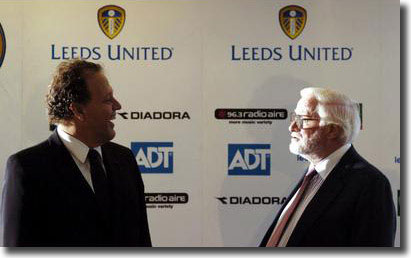 support
the Bates bid and held a sufficient share of votes to defeat any
other offer. As a consequence of this, little time was given to
elucidating on the merits of the other bids. Morris' offer was
the most generous, amounting to a settlement that would return
18p in the pound.
support
the Bates bid and held a sufficient share of votes to defeat any
other offer. As a consequence of this, little time was given to
elucidating on the merits of the other bids. Morris' offer was
the most generous, amounting to a settlement that would return
18p in the pound.
The Times: 'The administrators' report to creditors said with
legal precision: "The Forward Sports Fund are the only connected
creditors of the company as far as the administrators are currently aware
on the basis of the information provided to them to date." In other
words, they found no connection between Bates, Astor and Krato. Bates
has signed a declaration denying any links to Astor. So has Mark Taylor,
who sat alongside him on the old Leeds board and who is also involved
in the new bid. Astor has written a letter saying it has no link to Bates.
But Friday's meeting brought a bombshell revelation. Former Leeds chairman
Gerald Krasner, himself an insolvency expert, subjected KPMG's Richard
Fleming to more than an hour of forensic questioning. He taunted the administrators
with the fact - disclosed in Leeds' 2006 accounts - that Astor had been
linked to Bates' Forward Sports. Fleming said stiffly: "It's the
first time we have been made aware of it."
'There was more trouble to come. Fleming had said flatly that failure
to secure a deal to rescue Leeds would automatically mean it lost its
League status. But up popped the League's solicitor, Nick Craig, to point
out it need not happen "in exceptional circumstances". The League
has more than a passing interest. It is owed £177,000.
'The agitating by Krasner and his allies did produce one small victory.
Mark Taylor promised an extra payout for creditors if Leeds returns to
the Premiership within five years. But as the voting approached, there
were murmurs of 'stitch-up' as the combined might of the creditors backing
Bates was assembled.'
Mark Taylor accepted that there had been an association between Astor
and the Forward Sports Fund as of 30 June 2006, but then asserted, 'There
isn't now.'
After prolonged delays Fleming announced that Bates' offer had
received the necessary support, but, at 75.02%, by a very narrow
margin. He said that as a result of statements made during the
meeting that a Court challenge was possible and decided to adjourn
the meeting until 10am the following Monday, 4 June, to allow
a recount of the votes.
That recount showed a slightly larger vote in favour, 75.2%,
and Fleming confirmed that Bates' bid had been successful.
Among those voting against were HMRC, the Football League, Gerald
Krasner, Melvyn Levi, Simon Morris, Kevin Blackwell and David
Healy. The margin of success was £70,683 on a total vote of £36.1m
and it would have taken only a couple of parties to change their
vote for the deal to have been blocked.
Other points of contention were some of the rulings made by KPMG
as to allowable votes. Between them, Krasner, Morris, Levi and
Blackwell had claims of £21.2m, but only £6 was admitted to vote.
Further to this, as reported later by The Guardian, doubts were
raised about some of the value attached to votes. 'The two specific cases
raised by MPs yesterday were that of Yorkshire Radio, which declared no
claim in the preliminary statement that was issued to all creditors but
whose demand in the final document circulated at the vote was for £480,000.
Four of the directors of Yorkshire Radio also had board positions in the
club. The second case related to Mark Taylor & Company, whose principal,
Mark Taylor, is a director of both the club and the takeover consortium.
The company's initial claim rose from £59,756 to £273,615.32 in the final
analysis. "There was no point billing because I knew I wouldn't have
got paid," said Taylor yesterday. "I knew the club did not have
a lot of free cashflow. But the work had been done, so I was perfectly
entitled to do that."'
Despite all the doubts, the only way that the Bates takeover could now
be blocked was by a formal legal challenge. KPMG: 'There is now a 28-day
period which allows any creditor who wishes to dispute the CVA to go to
court, so the club will stay in administration officially for a further
28 days.'
HMRC quickly indicated that they would be challenging the decision, though
they waited until the very last moment, 4pm on Tuesday 3 July, to formally
confirm this. Over the intervening month, Bates had been locked in desperate
negotiations with HMRC to avoid a legal challenge, gradually increasing
the value of his bid. This was despite his bullish public utterances:
'The Inland Revenue acted extremely unreasonably. Over the last two-and-a-half
years Leeds have paid between £15m and £20m to the Revenue, but our cash
flow dried up and we asked for a holiday. The Revenue said no and put
forward the petition to wind up the club. I'm sorry small creditors have
lost money, but that is totally down to the Revenue. We were happy to
pay everyone over a period of time. The fault for Leeds United creditors
should be placed fairly and squarely at the Revenue's door.'
On 2 July, United issued the following statement: ;After meetings with
the Inland Revenue the administrator has negotiated an improved offer
to the creditors of Leeds United, offering them a further amount equal
to approximately 7p in the pound ... The original agreement also included
provision for a further £5m payment to creditors (approximately 30p in
the pound) should the club reach the Premier League within the next five
years. This period of time has now been extended to 10 years. This payment
compares favourably with dividends paid by other football clubs that have
been through the Administration process and with any offers that the Administrators
received prior to approval of the CVA.
back to top
'This offer is unconditional, subject to there being no challenge to
the administration and the Football League transferring Leeds United's
share to the NewCo. This offer is better than any other alleged offer
that has been made, all of which were subject to conditions and due diligence.
'If the CVA is challenged the consequence will be liquidation and Leeds
United will cease to exist and the loss of 500 jobs would be a further
drain on government resources with unemployment and social security benefits.
'It is our view that any appeal now will not be made on commercial grounds
but is either politically or personally motivated.'
Despite the improved offer, HMRC formally served notice of their attention
to appeal on 4 July. Two days later, it was announced that the hearing
would take place on 3 September. This left United's chances of competing
in the new season in doubt and KPMG responded instantly, announcing, 'We
are putting the club up for sale and offers must be in by 5pm on Monday
(9 July) and we are interested in talking to other parties.'
The decision sparked another hasty round of activity, both among
the press and the preferred bidders, including Redbus and Simon
Morris.
Simon Franks insisted he would fight 'tooth and nail' to gain control
of the club and admitted he was considering joining forces with Morris
to block Bates, adding, 'It is an absolute travesty. KPMG have asked us
to submit bids by 5pm on Monday, but they are not giving us access to
the management accounts. We have no idea what we are bidding for. I am
livid and it is a travesty.'
Franks was heavily critical of KPMG. As well as the timetable, he was
angry that bidders were unable to gain assurances over exactly what assets
were on offer - particularly whether they would be guaranteed to receive
the money banked from 9,000 season ticket sales. Describing the process
as 'crazy' and 'gob-smacking', he said: 'We may be bidding for something
we actually can't have, so it's frustrating and a little bit scary. It's
the first time in the history of our company we've taken part in such
a blind auction, but there you have it ... Our bid is still higher than
Bates' last published bid, but it is lower than we originally had.'
In the end, four bids were lodged with KPMG by the deadline and
a final decision was postponed until noon on 10 July to ensure
that bidders could demonstrate proof of funds. Eventually it was
announced that Bates' offer had been successful, but only because
of Astor's agreement to waive its right to a dividend from the
Bates deal. That reduced the value of the creditors to £12.6m,
as opposed to £30.2m for the other three offers, thus substantially
increasing Bates' pennies in the pound payment. It was later reported
that his deal was worth 11.2p in the pound, against the next best
deal of 10.3p. If not for Astor's waiver, Bates' package would
have been worth just 4.7p. The other bid offered £1.7m more in
cash than Bates.
Simon Franks was clearly gutted at missing out, saying, 'Obviously I'm
very disappointed. It's been a tortuous process and we put together what
we thought was a very brave bid. We have to remember that in the last
bidding, almost a month ago now, that our bid was significantly more than
Mr Bates'. I think we provided proof of funds of £10m against his £350,000
- and we still lost by the vagaries of the process that we're in. I cannot
believe that anybody outbid us but, in administration, the process is
very vague.'
Redbus believed that despite Astor's waiver, theirs was ultimately the
biggest offer KPMG received for Leeds. In its documents the administrator
did not account for an additional £8m that would have been paid by Redbus-Morris
in the event of the transfer of the Football Share which would allow the
newly owned Leeds United to kick off the new season. KPMG justified this
by saying that 'the additional £8m was to be used to settle football creditors.
It is a condition of the League that such football creditors are paid
in full in the event of agreement to transfer the football share. Therefore,
all the offers must satisfy this requirement and make such funds available.
Accordingly, even if the above offer had been capable of acceptance, it
would not have changed the administrators' decision to sell to [Bates].'
Redbus Chief Executive Dean Dorrell claimed that there had been no such
provisos set on the £8m payment. 'The only condition we put down on our
£11.501m bid was that £8m of it would be paid upon transfer 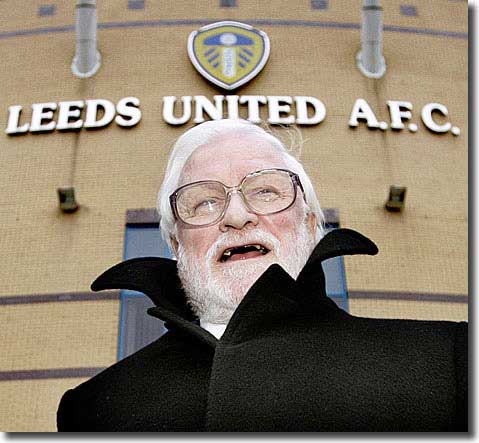 of
the Football League and [Football] Association shares,' he said. 'There
was no condition whatever of where that £8m would be paid: to the Football
League, football creditors or other such.'
of
the Football League and [Football] Association shares,' he said. 'There
was no condition whatever of where that £8m would be paid: to the Football
League, football creditors or other such.'
Ken Bates was delighted to retain ownership of the club, saying, 'Leeds
were in a mess when we took over ... But now we've got a clean start and
a clean sheet of paper. It's a big club ... and we can take it forward.
The delays have been annoying. Part of the delay has been caused by people
who've professed to love this great club and done their damnedest to cause
as much trouble as they can.'
back to top
KPMG sent a letter out to creditors on 24 July detailing the terms of
the actual sale to Ken Bates and comparing it with the other offers. Click
here to read the letter in full.
It was generally accepted that it would now be a mere formality
to regain the League Share that was required for United to start
life in League One, but getting agreement was soon found to represent
another serious obstacle.
The Football League's board was expected to rubber stamp the CVA at their
meeting on June 6 in Portugal. However, they refused to do so, deciding
instead to defer any decision until their following meeting, on 12 July,
and issuing the following statement: 'For legal reasons, it will now take
a further 28 days for the CVA to be formalised. During that period, the
League can make no further comment. The League has also confirmed to the
administrator the conditions that must be satisfied before the League
board can consider transferring the club's share in the Football League
to the new company.'
After the meeting on 12 July 12 they issued the following statement:
'To date, no documentation regarding the sale has been submitted to the
League by the administrators. Notwithstanding this, the board was asked
by the reported purchasers to consider an application to transfer Leeds
United's share in the Football League to them. The board was unable to
consent to this request this morning. Instead it has requested, from the
administrators, certain required documentation and assurances regarding
the sale of the club. The board also requires certainty on the current
legal proceedings surrounding the administration.
'The board had been expecting the administrators to attend today's meeting,
as KPMG originally requested. However, the League was informed late yesterday
afternoon that they would not be attending, with no explanation provided.
Additionally, the board expressed concern at the handling of the whole
process by the administrators and the chairman was instructed to obtain
legal advice in that regard.
'Clearly any further delays in this process will be frustrating for Leeds
supporters. However, like the club's fans, the board recognises the pressing
need for certainty regarding the future of league football in Leeds and
has agreed to convene at the earliest opportunity to reconsider the share
transfer, once it has been provided with all the relevant information.
'Also, for the avoidance of doubt, the League would like to make it clear
that there is nothing in its regulations to prevent a club beginning a
new playing season whilst in administration.'
United and KPMG rushed the requested documentation through to
the League, but there was then silence for a couple of weeks.
Football League representatives met with officials from United
and KMPG on 31 July and spent hours trying to agree the return
of the Football Share.
The League insisted that United had to leave administration via
a CVA. Chairman Lord Mawhinney said, "I spoke personally at length
to the highest levels of KPMG and Leeds United 2007 on Monday
and we then had a 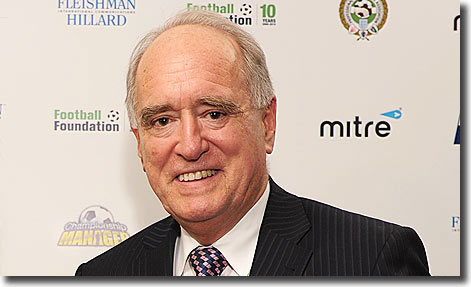 four
hour meeting here on Tuesday. We all agreed that the best way
to proceed was to try and reconstitute the CVA. This is the normal
way we get clubs out of administration. We have had 41 previous
clubs who have been in administration and all of them have gone
down this route, and I expect to hear back from KPMG their considered
opinion by the end of the week."
four
hour meeting here on Tuesday. We all agreed that the best way
to proceed was to try and reconstitute the CVA. This is the normal
way we get clubs out of administration. We have had 41 previous
clubs who have been in administration and all of them have gone
down this route, and I expect to hear back from KPMG their considered
opinion by the end of the week."
By 2 August KPMG had responded, rejecting the calls to reconstitute
the CVA, arguing that the intransigence of HMRC meant such a move
was doomed to failure.
Then came a totally unexpected turn of events.
The Football League accepted there were 'exceptional circumstances' but
decided they could not allow Leeds to operate in contravention of their
Insolvency Policy. 'The Football League Board agreed that, notwithstanding
the manner in which this administration has been conducted, the club should
be permitted to continue in the Football League,' said a statement. 'Consequently,
the board has decided to make use of the "exceptional circumstances"
provision within the League's Insolvency Policy, for the first time, and
agreed to transfer the club's share in the Football League to Leeds United
2007 Ltd. Accordingly, the club's share has now been transferred.
'However, it is acknowledged the club did go into administration and
has been unable to comply with the terms of the League's well-established
Insolvency Policy. As a result, the board determined this transfer of
membership should be subject to Leeds United having a 15-point deduction
applicable from the beginning of the 2007/08 season. Leeds subsequently
have lodged an appeal against this sanction, which will be heard at a
special meeting of all League clubs, to be arranged in due course.'
United appealed against the penalty, with the other 71 League chairmen
sitting in judgement. Ken Bates was incandescent about these arrangements,
pointing out the obvious conflict of interests. His complaints fell on
deaf ears and got Bates absolutely nowhere - the chairmen supported the
League's decision by an overwhelming majority.
It was like a death knell for United's promotion hopes, but at
least they could finally start making preparations for the new
season.
There was some good news on 30 August, with HMRC formally withdrawing
their legal challenge, due to be heard four days later. A spokeswoman
said it had become 'academic"' when the CVA was ditched in early July.
She would not be drawn on why it had taken the Revenue nearly two months
to formally kill off the case and nor would she elaborate on what steps
the taxman intended to take regarding the money owed.
It had taken four months, but finally one of the most dramatic
periods in the intriguing history of Leeds United had drawn to
a close and attention could return to onfield affairs.
Part 2 The fightback begins - Part
3 Return of the Mac - Results and table
Administration and aftermath - The
Chronology
back to top













 summarised as follows:
summarised as follows:
 too
deep. I am interested in trying to get Leeds back where they belong, which
is in the top six of the Premiership. I've held talks with some influential
people and the feedback has been good. I will be holding more talks in
the next few weeks. The money is not a problem ... But that is not the
point. I will not make any approach until I am 100 per cent certain that
I can find the management team that will put Leeds United back on its
feet.'
too
deep. I am interested in trying to get Leeds back where they belong, which
is in the top six of the Premiership. I've held talks with some influential
people and the feedback has been good. I will be holding more talks in
the next few weeks. The money is not a problem ... But that is not the
point. I will not make any approach until I am 100 per cent certain that
I can find the management team that will put Leeds United back on its
feet.' Wimbledon
to the High Court in an unsuccessful attempt to overturn the ruling.
Their failure only made them more determined to find another high
profile test case - Leeds United were the perfect candidates.
Wimbledon
to the High Court in an unsuccessful attempt to overturn the ruling.
Their failure only made them more determined to find another high
profile test case - Leeds United were the perfect candidates. support
the Bates bid and held a sufficient share of votes to defeat any
other offer. As a consequence of this, little time was given to
elucidating on the merits of the other bids. Morris' offer was
the most generous, amounting to a settlement that would return
18p in the pound.
support
the Bates bid and held a sufficient share of votes to defeat any
other offer. As a consequence of this, little time was given to
elucidating on the merits of the other bids. Morris' offer was
the most generous, amounting to a settlement that would return
18p in the pound. of
the Football League and [Football] Association shares,' he said. 'There
was no condition whatever of where that £8m would be paid: to the Football
League, football creditors or other such.'
of
the Football League and [Football] Association shares,' he said. 'There
was no condition whatever of where that £8m would be paid: to the Football
League, football creditors or other such.' four
hour meeting here on Tuesday. We all agreed that the best way
to proceed was to try and reconstitute the CVA. This is the normal
way we get clubs out of administration. We have had 41 previous
clubs who have been in administration and all of them have gone
down this route, and I expect to hear back from KPMG their considered
opinion by the end of the week."
four
hour meeting here on Tuesday. We all agreed that the best way
to proceed was to try and reconstitute the CVA. This is the normal
way we get clubs out of administration. We have had 41 previous
clubs who have been in administration and all of them have gone
down this route, and I expect to hear back from KPMG their considered
opinion by the end of the week."